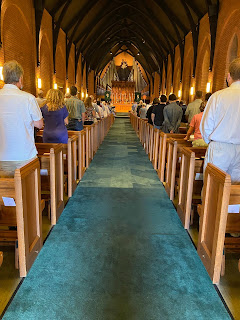Lectionary:Genesis 45:3-11, 15; Psalm 37:1-12, 41-42; 1 Corinthians 15:35-38,42-50; Luke 6:27-38
En el nombre del Dios: que es trinidad en unidad. Amen.
In our Collect today, we prayed that the Holy Spirit would come to us and pour into our hearts her greatest gift, which is love, the true bond of peace and the source of our life because outside of God’s love, there is no life, only death.
Love requires relationship, and it begins with God. The Trinity of God is a dynamic relationship – an active, expressive, complementary way of being. Love reconciles, restoring harmony and wholeness, to whatever or whoever is separated or divided. Wherever God sees division, God acts to redeem, filling the gaps with God’s own self.
What is so important for us to remember as followers of Christ who embody his spirit, is that we are the current vehicles of this redeeming, reconciling love on earth. God looks through our eyes, responds in our hearts, and acts through our hands.
The word for love used in our gospel reading is Agape – a familiar word, I think, for most of us. Agape love is full of goodwill. It is deliberate – a choice to pay attention to someone else, have regard for them, and respect them. Agape love is reflected in our Baptismal vow to respect the dignity of every human being.
Agape love is also self-denying and compassionate. It places the other ahead of self. It joins us to another in their suffering because to have compassion is to suffer with someone. (Com = with, passio = suffer) Agape love means being willing to share someone else’s nightmare and bear light into their darkness – even when drawing near to them puts our comfort or our safety at risk.
Part of the problem is that we have only one word for the many faces of love. Agape love is not attraction – romantic or physical. That’s eros. It isn’t about liking someone. That’s philia. And it isn’t about being bonded by empathy. That’s storage.
In this teaching, Jesus is calling us to a particular kind of love: agape love. Theologian and author Allen Myers defines agape love as: “the divine, selfless love which will go to any length to attain the well-being of its object.” Myers, Allen C., The Eerdmans Bible Dictionary (Grand Rapids: William B. Eerdmans Publishing Company, 1987), 26. And we don’t have this kind of love unless God gives it, hence our prayer in our Collect today: pour into our hearts your greatest gift, God, which is love.
In this continuation of his beatitudes sermon, Jesus is teaching a new way for us to bear love into the world – one that goes against our natural inclination. Did you know that biologically, humans have a part of the brain specifically designed for making judgments? The role of this part of the brain is to divide input into binary categories that enable us to differentiate between what or who is safe and what or who isn’t.
It’s a built-in survival mechanism designed by a loving God by whom we are marvelously made. When fear and self-centeredness take over, however, this kind of bifurcation extends into our cultural consciousness and we find ourselves constantly challenged by our propensity to create categories of “us” and “them.”
Over time, prejudices develop around those categories. Soon the “other” becomes the enemy – which literally translated means, ‘not friend.’ This is the kind of judgment Jesus warns us against when he says, “Do not judge…”
It’s important to remember that in our gospel story Jesus is speaking to a people who are currently oppressed and know what it feels like to be hated, dismissed, ignored, and disrespected. They are the “them” in their culture and they’ve already had a long history of being the targets of oppression and genocide. They know who their enemy is.
To survive, they separated themselves, marking their separation with circumcision and ritual practice. Jesus is calling them (and us) to reconciliation rather than separation – even when that separation is meant to ensure our survival.
Jesus’ way of love calls us to trust God for all we need, including our survival. This is the kind of love that was demonstrated by Joseph in our reading from Genesis and it’s what the Psalmist is calling us to – a love that isn’t distracted by those who don’t love, tempting us to abandon our way of love.
Truly, none of us can do this easily or successfully all the time, but we know when we aren’t there, don’t we? We know when disdain or indifference or hate infect our hearts. We know when we allow unjust systems that benefit us to go unchallenged.
So what do we do? Well, we’re Episcopalians, so we pray together. In all our diversity, what unites us is our worship. So, we pray in community, drawing ourselves closer to God and nourishing ourselves with Word and Sacrament. Our common prayer opens a pathway for God to act in us and through us in the world.
As Julian says, “Prayer fastens the soul to God,” uniting our will to God’s will by “the deep inward working of the Holy Spirit.” In her vision, God spoke this to Julian: “Pray inwardly, even though you feel no joy in it. For it does good, though you feel nothing, see nothing, yes, even though you think you cannot pray. For when you are dry and empty, sick and weak, your prayers please me, though there be little enough to please you. All believing prayer is precious in my sight.'”
Prayer is how we cooperate with God in the continuing work of reconciliation. There are so many examples of this, but I’ll offer just this one: when we pray God’s lavish blessings over those we’d rather not love, that prayer changes us, enabling us to receive God’s greatest gift into our hearts. It allows us to draw nearer to them and establish relationship with them. Once that happens and we begin to know the person, we are set from the prejudices that held us bound and we are free to love.
When we separate ourselves from anyone or any group of people, it’s easy to depersonalize them and dismiss the fact that God’s spirit dwells in them. It’s easy to make them “other” and oppress them.
A glaring example of this is found in our own history: Article one, section two of the Constitution of the United States, ratified in 1788, declared that any person who was not free would be counted as three-fifths of a free individual for the purposes of determining congressional representation. The "Three-Fifths Clause" as it was known, thus increased the political power of slaveholding states furthering and justifying the oppression of African American people. There is currently legislation being considered that targets the rights of transgender people. It’s like we never learn…
We who follow Jesus know by our faith that we are loved, and from that eternal well of love there is endless refreshment. That’s why we can be the bearers of God’s redeeming, reconciling love into the world.
In Jesus' time as in our own time, the world doesn’t always welcome agape love. The systems of the world are designed to provide an elite few with power, privilege, and wealth. They don’t want to share opportunities or resources and they don’t want equality. Those benefitting from the unjust systems of the world will often kill the bearer of agape love knowing they pose a threat to the status quo, and they are prepared to work together to stop anyone who tries to take their prize from them.
Dr. King knew that. He talked about it in his last speech in Memphis. Like him, all bearers of agape love must trust God completely. We do not fear, because as Julian of Norwich says, “In [God’s] love [God] clothes us, enfolds us and embraces us; that tender love completely surrounds us, never to leave us.” (Feast of Anglican Spirituality, 137)
I close with a prayer from the Rev. Shaneequa Brokenleg, Racial Reconciliation Officer in the Diocese of South Dakota. Let us pray…
“Oh God of all comfort and giver of every good thing, we pray that you fill us with the desire to be your hands and feet in the world, so that the hungry are filled with good things and all may experience your reconciling love. Amen.” (The United Thank Offering Book of Prayers, 51)









